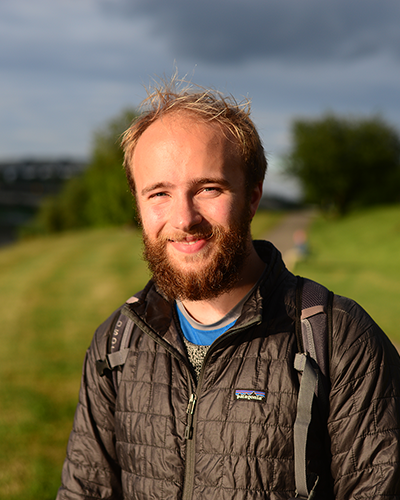 To mark the end of finals week, the next installment of our Undergrad Spotlight features a member of the UW CSE community who devotes his spare time to helping other students to succeed. Meet Johan Michalove, a senior from Bellevue, Washington who has spent the past three years tutoring students and currently serves as chair of the UW ACM, the campus chapter of the Association for Computing Machinery.
To mark the end of finals week, the next installment of our Undergrad Spotlight features a member of the UW CSE community who devotes his spare time to helping other students to succeed. Meet Johan Michalove, a senior from Bellevue, Washington who has spent the past three years tutoring students and currently serves as chair of the UW ACM, the campus chapter of the Association for Computing Machinery.
Michalove is double-majoring in Computer Science and Philosophy. As ACM chair, he strives to make the CSE community vibrant and inclusive by coordinating a variety of events and programming. As a high school tutor, he inspires students to do more than succeed on a test — he helps them to develop a lifelong love of learning.
CSE: Why did you choose to study computer science?
JM: I first got excited about computer science through taking the intro series during my freshman year. I chose CSE because the concepts fascinated me, and also for how quickly you can go from an idea to a real, tangible object that people can play with or benefit from.
CSE: What is your favorite thing about being a UW CSE student?
JM: Our undergraduate community, definitely. The variety of my classmates’ interests continues to surprise me. I’m always hearing about new obscure subjects, side projects, and interesting experiences.
CSE: Who or what in UW CSE has inspired you the most?
JM: I’ve enjoyed mentorship from faculty who are advancing CS and laying the groundwork of CS education. It’s inspiring and humbling to witness the formative years of a relatively young subject. Adam Blank‘s approach to designing and structuring meaningful, yet highly scalable learning experiences has given me many new insights how technology can improve education.
CSE: What made you decide to tutor high school students?
JM: At the outset, I was just excited to teach and have a platform to gain mentorship and experience in the craft of teaching. As a college freshman I didn’t know what I constantly see today: many intelligent students near the end of high school lacking a strong foundation in basic reading, writing or math skills. Within the public school system, it’s particularly easy for students to slip through the cracks, only to arrive to college and realize they’ve never learned how to study or take on truly difficult academic endeavors. I also didn’t realize the number of high school students who have acute learning disabilities and test anxiety. I’ve had students break into nervous sweats when a math test is placed before them. I’ve stayed on to explore how I can help these students and hone my abilities as a teacher and mentor.
CSE: How are you helping your students to overcome those challenges?
JM: My primary role is preparing students for the standardized tests they take to enter college. Many of our students have learning disabilities and special accommodations, so we work to understand where they’re falling behind and exactly how they can improve their performance. Although the teaching is ostensibly about tests, my goal is to help students find an engaged, positive attitude towards learning even when the subject-matter seems dry — we are talking about standardized tests! — so they can take that with them to whatever pursuits they follow. This often involves helping them overcome a particular fears or anxieties and providing mentorship, supplemented by content knowledge.
In the most severe cases, I’ve taught high school juniors multiplication and division. More frequently they come in without understanding basic geometry and algebra. Many of my math students are baffled by the reading passages. Teaching effectively from the 1st to the 99th percentile is difficult. Three years later, I’m still finding new ways to sharpen my approach.
CSE: What kind of impact are you making in this role?
JM: My work directly helps students whose needs were not fulfilled by the regular educational system. Although the number of students I teach is a blip compared to UW classes or the scale reached by MOOCs, the goal is for students who’re seldom at ease in the classroom to have genuine, positive learning experiences. I would like to think that through the tests, we’re teaching students how to learn (and often for the first time). It’s exciting to be involved in the formative stages of these individuals, and it’s not uncommon for students to come back and say that preparing for the tests was the first time they ever enjoyed learning.
CSE: What is your favorite memory/project so far?
JM: Those lightbulb moments when you know something just “clicked” perfectly for a student. Their eyes light up and they let out an excited “Ohhhhhhhhhh.” You know it’s a concept they’re never going to forget.
CSE: How does this position relate to your long term goals?
JM: Shhh, they’re still under wraps. Though you can probably guess they involve education and computer science.
Thank you, Johan, for your leadership and service! And happy end of finals to all of our undergrads — see you next quarter!

